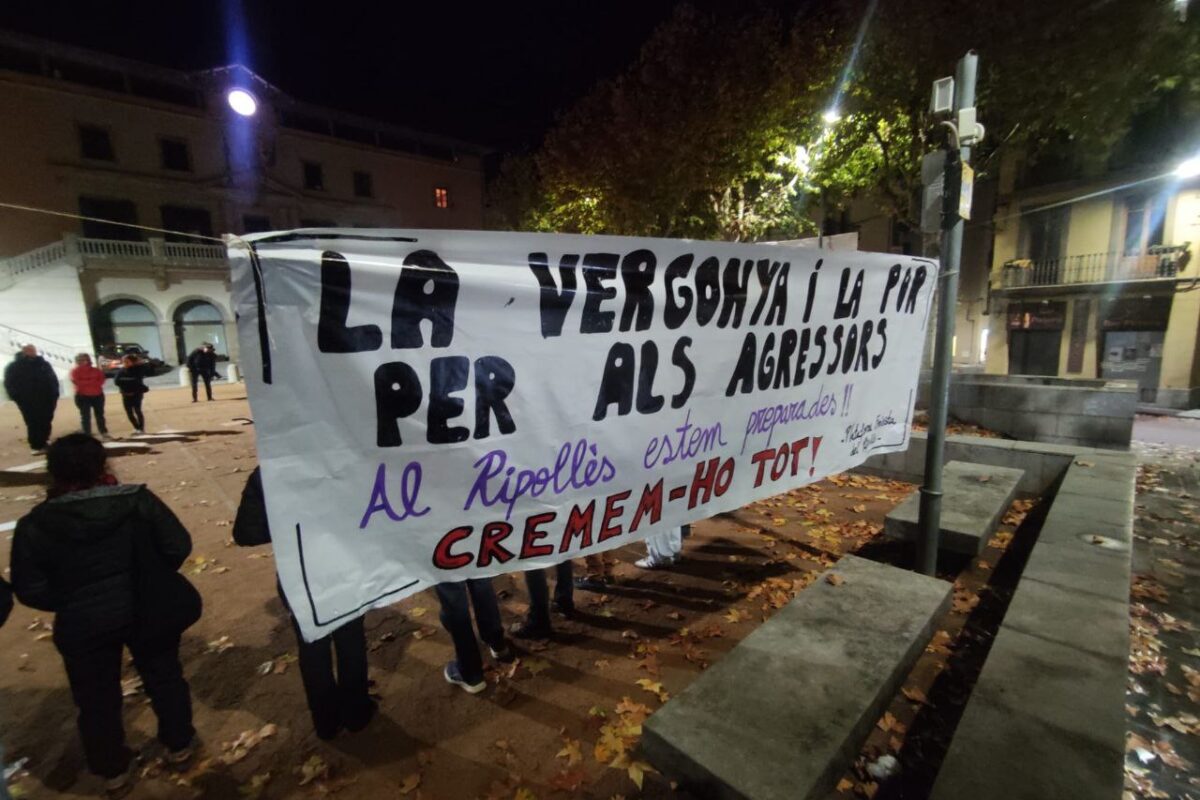The 25th of November, International Day for the Elimination of Violence Against Women, commemorates the Mirabal sisters, murdered in 1960 under Trujillo’s fascist regime in the Dominican Republic. On this day last week I found myself in Ripoll, a Catalonian town of 11,000 in the north of Spain. A far-right, Catalan identitarian woman, Sílvia Orriols, has served there as mayor since 2023. Elected in June 2023 with just 30% of the vote, she has since taken a seat in the Catalan Parliament following regional elections last summer.
The mayor organized an event titled “Against the Imposition of the Islamic Veil” as the Council’s only 25th November activity. This event, featuring two speakers from her party and a male supporter, was promoted through a shocking video filled with violent imagery vilifying non-white people in grotesque and bigoted terms. Public funds were used for this openly Islamophobic act disguised as a feminist cause.
The day before, on November 24, a local feminist group held an evening rally in the town square, reading a manifesto against sexism, misogyny, homophobia, and racism. Police presence was disproportionate, a first for a 25th November event. Patrol cars encircled the protest on orders from the mayor, who was notably present at her office on a Sunday evening, an unusual occurrence (worth mentioning that her office was the only room lit up in the whole Town Hall building, and has direct views to the square were we were all gathered). After the rally, the two women who made the speeches were stopped by police, had their IDs checked, and were insulted by them as “pathetic” and threatened with fines. Other activists have already had to pay, for the crime of putting up posters in the street against Orriols’ racist campaigns. The next day the mayor tweeted that the protest was anti-feminist and illegal — dismissing it as a hate act against her, a woman. She weaponized the feminist cause while at the same time repressing and intimidating the members of the local feminist organisation in in her own town.
On the 25th, in Berlin, police violently suppressed protests against gender violence. Women in the streets faced physical violence for demonstrating, a continuation of the state’s ongoing repression of queer and FLINTA individuals, particularly in solidarity with Palestine. Over the past year we’ve seen the state deliberately targeting these groups at Palestine solidarity demonstrations, seeking to empty these protests of women and queer participants by beating them up, and in some cases sexually harassing them (as seen in the Freie Universität occupation, and in public transport arrests after demos). This tactic serves a dual purpose: to undermine the movement by framing it as a male-dominated bunch of immigrants who are threatening “Western values of feminism”, while simultaneously perpetuating police violence against absolutely everyone who speaks up for Palestine.
Both the events in Ripoll and Berlin reveal how resistance by women is met with repression. Whether from fascists or the German state, both follow exactly the same narratives of imperialist-feminism upholding white supremacy and self-serving identity politics. Liberal feminism is also responsible for the rise of these tactics by using the subject “woman” as a blank cheque to oppress or exploit other political subjects. This just proves how the feminist struggle is fundamentally rooted in class solidarity, directly opposing identity politics that serve capitalist interests rather than challenging the economic-social structure that enables sexism and misogyny.
What is also clear in both contexts is that against their intimidation and repression strategies, whether through physical violence, harassment, fines, home raids, arrests, or anything else, we will only achieve liberation through a united organised front. Let the Berlin context serve as an example of how to respond to state repression by taking to the streets — at demonstrations and rallies, week after week, putting our bodies and using our voices directly in the face of the German State. We will not allow it to silence the Palestinian, antifascist, antiracist and feminist movement.
However, our success depends on more than just a few of us participating. What is imperative is to confront intimidation by building solidarity and mobilizing the broader community of our friends, neighbours, families, work colleagues or people directly affected by their racist and fascist policies. Without these connections the movement risks becoming atomized, making it easier for the government to suppress.




